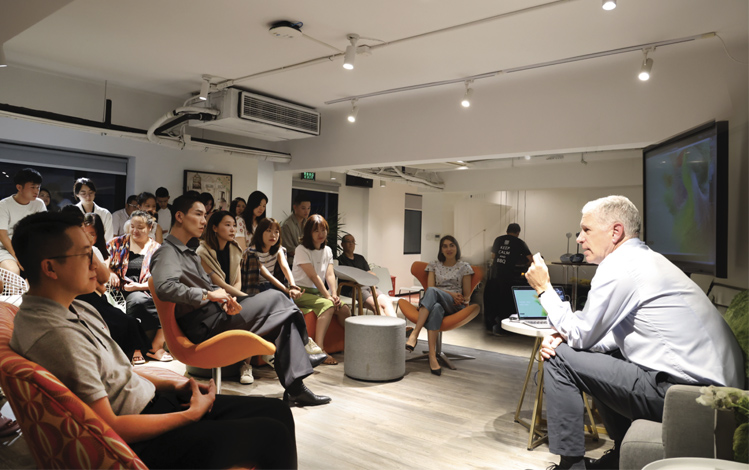

Why You Should Take Leadership Personally
Building Relationships with Employees, Clients and Prospects
“What is your biggest regret from the past year?”
That’s a question I might expect from my manager or a mentor, or one that I might ask myself as part of annual business planning, but it’s not a question I expected from one of our team members at the end of a Thursday in September, in Shanghai.
I’m glad he asked the question, and I’m glad that a room full of our colleagues got to hear my answer.
I responded that the inability to meet in-person had a knock-on effect on our internal communications, particularly in China; that I, and all of our global leaders weren’t as visible or accessible to colleagues in Shanghai and Beijing; and that stories of their successes weren’t being celebrated as loudly as we’d like.
The bottom line: if you want to be an effective leader, you have to make it personal. I firmly believe that, and this belief is supported by the data in WE’s latest Brands in Motion research.
No matter how accessible any leader might want to be on email, Teams, or at headquarters, the gap between leaders and employees and agencies and their client partners is one that can be hard to close. Getting out to meet people as often as possible, in their hometown, sitting and working with them in the office, and really listening to their needs is a failsafe way to make our relationships more personal and, with intent, more effective.
As an international leader, I travel frequently, meeting with our people, clients and partners around the world. After a few years of travel restrictions, I’ve just returned from a long-awaited trip to China – the first visit I’ve been able to make to the market in a few years.
I meet with members of our leadership team in China regularly on video calls, chat via Teams, and am in email conversations with them every day. So why did the time I spent in our Shanghai office, speaking to employees at every level, meeting with clients and prospects, feel so different? Because it was personal.
There was no screen between us, no email or chat “send” button to hover over, just the opportunity to have open and honest conversations about the issues that matter to them most. These conversations revealed employee perspectives that might not have reached me through employee surveys, annual reviews or filtering up through levels of management.
Why effective, accessible comms is essential
WE’s latest Brands in Motion research shows that in many cases the gaps between what business leaders say and what employees experience are growing. This underscores the importance of an engagement strategy that is dynamic, ambitious, and – as much as possible – in person.
Listening and acting with authenticity builds trust and rapport. Employees who know their leaders are motivated and willing to engage are more likely to feel motivated to raise issues that affect their own roles.
A great example of this comes from food-delivery platform, DoorDash, and its recognition of the time and work required to lead employee resource groups (ERGs). A way to foster a sense of belonging in the workplace for underrepresented groups, ERGs are now standard in workplaces, but research suggests that only 6% of ERG leaders are compensated.
DoorDash announced in 2022 that it would begin compensating the leaders of its eight official ERGs. Theresa Avila, lead recruiter for DoorDash, says the change led to a stronger program for connecting ERG members to job candidates — and better hiring results. “In today’s market, candidates are increasingly looking for a company with a good culture, a focus on DEI, and support for those in traditionally marginalized communities,” she said. “A call with an ERG member could make a huge difference in someone’s decision to join DoorDash.”
At WE, we’ve taken a similar path, making ERG coordination a part of a leaders’ job, with recognition for it in-role, making sure it’s included within regular hours, and with bonus payments.
This year’s Brands in Motion research shows that 83% of respondents believe that a respect for employees’ work-life balance is a critical component of a brand’s reputation, and 92% of Brands in Motion respondents worldwide believe that employer-employee relations are among the essential characteristics for a company to build and maintain a great reputation. By engaging directly with employees, leaders have the opportunity to identify these priorities and help them be a part of creating a solution.
Bold new priorities – making business personal
While in Shanghai, I led a roundtable with the British Chamber of Commerce (BritCham), meeting senior leaders from multinational brands investing in China. The subject of our discussion, which could have fueled conversation for the full day, was: “What’s keeping CEO’s up at night?”
Many leaders, it seems, are challenged by the balance of attention between long-term business concerns and strategy, and immediate opportunities. By focusing on immediate business concerns, strategic opportunities can often be left behind. It’s too easy for communications teams to get caught on the treadmill of urgent campaign deliverables and reactive requests, meaning that the bigger pain points can get overlooked.
Leaders need to step forward here, looking beyond prescribed internal and executive communication remits, and meet with clients to personally understand their bigger needs and challenges. By doing this, we understand their business better, their strategic imperatives, and can communicate more effectively with their employees.
From my own conversations with businesses, discussing the challenges they face, there’s an appetite for strong storytelling that starts at home. Brand leaders understand that by developing a deeper level of employee engagement, which takes a more integrated approach, this will pull through to improved brand reputation.
Eight out of 10 Brands in Motion respondents say reputations can be improved. By being transparent with data that tracks progress, and with regular content that explains what the company is doing and why, people believe that brands can improve their reputation, winning new customers and attracting new talent.
Walk in someone else’s shoes
My favorite part of business travel is spending quality time with my international colleagues. Engaging in authentic conversations and experiencing their day-to-day is an effective way to understand people’s immediate, personal concerns.
In Shanghai, I sat working with the team in the office, had lunch and dinner with them, and spent time out in the city attending a client’s grand opening event. This quality time with colleagues helps me better understand the markets in which we operate and understand our employees’ immediate concerns, ensuring that a positive company culture is maintained across every level.
By creating informal and personal spaces for employee engagement, away from pulse surveys and meeting agendas, you create room for values-led conversations that might not happen otherwise. It’s from conversations like these that strategies like enhanced parental leave might develop, or something as simple as improving waste recycling in the office.
Push your own boundaries
By pushing your own boundaries of transparency as a leader and showing how you’re moving forward with commitments and owning up to where you fall short, you build trust with employees.
Many leaders are comfortable on stage, or invest time in sending out regular newsletters. These are important, but actually sitting down, having an open dialogue, in an informal, transparent way is vital in creating engagement. Even when you can't answer every question, we have to be comfortable being uncomfortable with all employees and customers. This is what employees seek from their leadership.
A transparent, open dialogue between leaders and employees, drives more than positive employee engagement and satisfaction alone. It means that your business can be more agile, and in turn more resilient to challenges. Your employees have the power to be the best advocates for your brand. By being a highly engaged leader, connecting with employee values, and improving employee morale and employee satisfaction, you’ll see that positive corporate reputation reach your clients and customers, too.
The latest blogs from WE
Decoding Gen Alpha: A Primer on the Next Gen of Consumers
Why Gen Alpha Will Fuel Spending This Season
Why Reputation Is a Business Driver in Healthcare


